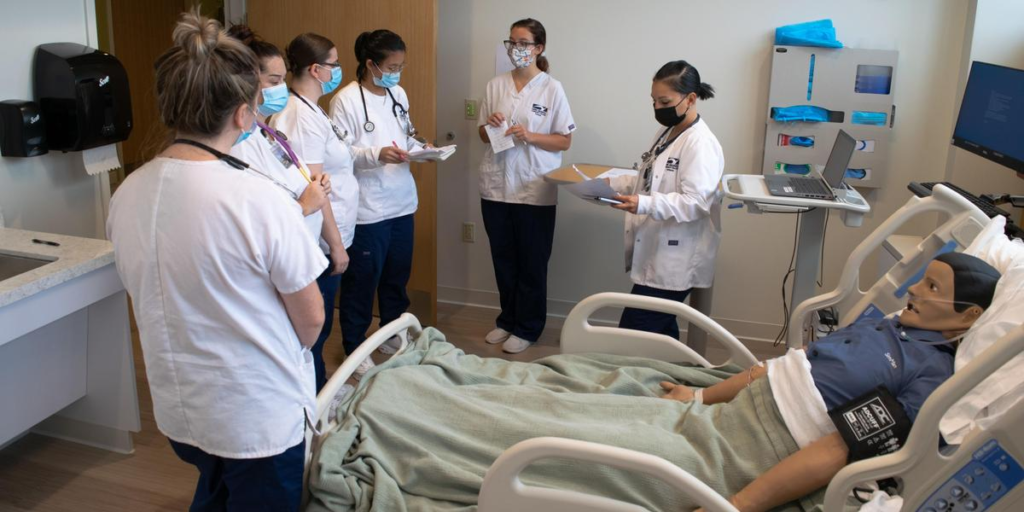GDA Nursing Class Notes 21
OPERATION THEATRE
An operating theatre, also known as an operating room (OR) or surgery suite, is a specially designed and sterile environment within a hospital or healthcare facility where surgical procedures and invasive medical interventions are performed. Operating theatres are dedicated spaces equipped with advanced surgical equipment, instruments, and a highly trained surgical team. The primary purpose of an operating theatre is to provide a controlled and aseptic setting for surgical procedures to be conducted safely and effectively.

CARDIOLOGY DEPARTMENT
The Cardiology Department is a specialized clinical department within a hospital or healthcare facility that focuses on the diagnosis, treatment, and management of cardiovascular or heart-related conditions and diseases. Cardiology is a medical specialty that deals with the heart and blood vessels, including the prevention, diagnosis, and treatment of various cardiac disorders. The Cardiology Department is staffed by healthcare professionals who are experts in this field and includes cardiologists, cardiac surgeons, nurses, and other specialized staff.

GERIATRIC DEPARTMENT
A Geriatric Department, also known as a Geriatrics Department or Geriatric Medicine Department, is a specialized clinical department within a healthcare facility, such as a hospital or medical center, that focuses on the healthcare needs of older adults, typically those aged 65 and older. Geriatrics is a medical specialty that addresses the unique healthcare challenges, medical conditions, and well-being of older individuals. The Geriatric Department is staffed by healthcare professionals who have specialized training and expertise in geriatric medicine.

GYNECOLOGY DEPARTMENT
A Gynecology Department, often referred to as a Gynecology Clinic or Gynecology Department, is a specialized clinical department within a hospital or healthcare facility that focuses on the healthcare needs of women, particularly those related to the female reproductive system and gynecological health. Gynecology is a medical specialty that deals with the diagnosis, treatment, and management of various gynecological conditions, reproductive health issues, and women’s health concerns. The Gynecology Department is staffed by healthcare professionals who have specialized training in gynecology and women’s health.

MATERNITYDEPARTMENT
A Maternity Department, often referred to as a Maternity Ward or Obstetrics Department, is a specialized clinical department within a hospital or healthcare facility that is dedicated to providing care for pregnant women and the management of childbirth. The primary focus of the Maternity Department is to ensure the safe delivery of babies and to provide comprehensive care to expectant mothers before, during, and after childbirth. This department is staffed by healthcare professionals with expertise in obstetrics and neonatal care.

NEONATES INTENSIVE CARE UNIT
Neonatal Intensive Care, often abbreviated as NICU (Neonatal Intensive Care Unit), is a specialized medical unit within a hospital or healthcare facility that is dedicated to providing intensive medical care and treatment to newborn infants, particularly those born prematurely or with serious medical conditions. The Neonatal Intensive Care Unit is designed to address the unique healthcare needs of neonates (newborns) who require close monitoring, specialized equipment, and expert medical attention.

PEDIATRICS DEPARTMENT
A Pediatrics Department, often referred to as a Pediatric Department or Pediatrics Ward, is a specialized clinical department within a hospital or healthcare facility that is dedicated to providing comprehensive medical care to infants, children, adolescents, and sometimes young adults. Pediatrics is a medical specialty focused on the health, development, and well-being of pediatric patients, ranging from newborns to young adults up to the age of 18 or 21, depending on the healthcare facility’s policies. The Pediatrics Department is staffed by healthcare professionals who are trained and experienced in the care of young patients.

ONCOLOGY DEPARTMENT
An Oncology Department, often referred to as a Cancer Center or Oncology Ward, is a specialized clinical department within a hospital or healthcare facility that is dedicated to the diagnosis, treatment, research, and management of cancer. Oncology is the medical specialty focused on the study and care of patients with cancer, which includes the treatment of various types of cancer, cancer-related symptoms, and the support and well-being of cancer patients. The Oncology Department is staffed by healthcare professionals who are specialized in oncology and work collaboratively to provide comprehensive cancer care.

ORTHOPEDIC DEPARTMENT
An Orthopedic Department, also known as an Orthopedics Department or Orthopedics Ward, is a specialized clinical department within a hospital or healthcare facility that focuses on the diagnosis, treatment, and management of musculoskeletal conditions and disorders. Orthopedics is a medical specialty that deals with the bones, joints, muscles, ligaments, tendons, and other structures that make up the musculoskeletal system. The Orthopedic Department is staffed by healthcare professionals who specialize in orthopedic medicine and surgery.

NEUROLOGY DEPARTMENT
A Neurology Department, often referred to as a Neurology Clinic or Neurology Ward, is a specialized clinical department within a hospital or healthcare facility that is dedicated to the diagnosis, treatment, and management of disorders related to the nervous system. Neurology is a medical specialty that focuses on the study and care of patients with neurological conditions, which include diseases and disorders of the brain, spinal cord, nerves, and muscles. The Neurology Department is staffed by healthcare professionals who are specialized in neurology, including neurologists, nurses, and support staff.

PSYCHIATRY DEPARTMENT
A Psychiatry Department, often referred to as a Psychiatry Clinic or Psychiatry Ward, is a specialized clinical department within a hospital or healthcare facility that focuses on the diagnosis, treatment, and management of mental health disorders and conditions. Psychiatry is a medical specialty that deals with the study and care of patients with psychiatric and psychological disorders, including mood disorders, anxiety disorders, psychotic disorders, substance use disorders, and more. The Psychiatry Department is staffed by healthcare professionals who specialize in psychiatry, including psychiatrists, psychologists, psychiatric nurses, social workers, and therapists.

INPATIENT DEPARTMENT
An Inpatient Department, also known as an Inpatient Unit or Inpatient Ward, is a specialized area within a hospital or healthcare facility where patients receive medical care and treatment that requires them to stay in the hospital for an extended period, typically for more than 24 hours. Inpatient care is provided when patients have medical conditions or surgical needs that cannot be adequately managed through outpatient or ambulatory care. The Inpatient Department is staffed by a team of healthcare professionals, including physicians, nurses, and support staff, who provide around-the-clock medical care and monitoring.

OUTPATIENT DEPARTMENT
An Outpatient Department, often abbreviated as OPD, is a specialized area within a hospital or healthcare facility where patients receive medical care, consultations, diagnostic tests, and treatment without being admitted to the hospital for an overnight stay. Outpatient care is provided for a wide range of medical conditions that do not require continuous monitoring or an extended hospital stay. The Outpatient Department is staffed by healthcare professionals, including physicians, nurses, technicians, and support staff, who provide medical services to patients on an outpatient basis.

NURSING DEPARTMENT
A Nursing Department is a crucial component of healthcare organizations, such as hospitals, clinics, long-term care facilities, and healthcare institutions. It encompasses various aspects of nursing care and plays a central role in patient care delivery, quality improvement, and patient safety.

IT INCLUDES
•PATIENT CARE
•EDUCATION
•REGISTRATION AND RECORD
•MONITORING AND EVALUATION
•WARD ADMINISTRATION
SUPPORTIVE DEPARTMENTS
Supportive Departments in a healthcare organization are essential components that provide a range of non-clinical services, administrative functions, and infrastructure support to ensure the smooth operation of the healthcare facility. These departments play a crucial role in maintaining the quality, safety, and efficiency of healthcare services.
PHARMACY DEPARTMENT
he Pharmacy Department, often referred to as the Pharmacy or Pharmacy Services, is a critical component of healthcare organizations, such as hospitals, clinics, and long-term care facilities. It is responsible for the management, preparation, dispensing, and monitoring of medications and pharmaceuticals for patients.

RADIOLOGY DEPARTMENT
The Pharmacy Department, often referred to as the Pharmacy or Pharmacy Services, is a critical component of healthcare organizations, such as hospitals, clinics, and long-term care facilities. It is responsible for the management, preparation, dispensing, and monitoring of medications and pharmaceuticals for patients.

PATHOLOGY DEPARTMENT
he Radiology Department, also known as the Radiology and Imaging Department or Radiology Services, is a critical component of healthcare organizations, such as hospitals and medical clinics. It is responsible for performing a wide range of diagnostic imaging procedures and using various imaging technologies to visualize and assess internal body structures, organs, and tissues.

.NUTRITION AND DIETETICS
The Nutrition and Dietetics Department, also known as the Nutrition Services Department, is a crucial component of healthcare organizations, such as hospitals, clinics, and long-term care facilities. It focuses on promoting and providing optimal nutrition and dietary care to patients, residents, and clients to support their overall health and well-being.

HOUSE KEEPING
Housekeeping in a healthcare setting refers to the department responsible for maintaining cleanliness, sanitation, and overall hygiene within the healthcare facility. Proper housekeeping is crucial in healthcare settings to ensure patient safety, infection control, and a clean environment conducive to healing and recovery.

ADMINISTRATIVE DEPARTMENT
The Administrative Department in a healthcare organization is responsible for the management and coordination of various administrative functions, including planning, organization, and support services that are essential for the smooth and efficient operation of the healthcare facility. This department plays a crucial role in ensuring that administrative and non-clinical tasks are effectively managed, allowing healthcare providers to focus on patient care.

